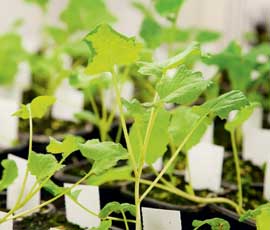Fifty jobs to go at Rothamsted and Broom’s Barn

Up to 50 researchers could lose their jobs through voluntary redundancies at Rothamsted Research, including Broom’s Barn Research Station, as a result of a major strategic reorganisation of the Biotechnology and Biological Sciences Research Council-funded institute.
The new strategic plan will focus on delivering world-class research in the areas of plant productivity, quality traits relating to nutrition and health, climate change and the carbon economy and the long-term sustainability of agricultural practices, Maurice Moloney, director of Rothamsted Research told Farmers Weekly.
“Those are the four areas where we believe we can make serious scientific contributions.”
But the reorganisation has cast a cloud on the future of some of the more near-market research carried out by Rothamsted and at Broom’s Barn, and the institute’s capability to retain the ability to receive and respond to the industry’s needs.
Research in herbicide resistance, nematology, some aspects of insect ecology and work investigating fermentation and anaerobic digestion would be reduced or curtailed, Prof Moloney confirmed, while up to eight staff at Broom’s Barn would be asked to relocate to Harpenden.
The reorganisation would have occurred regardless of the government’s Comprehensive Spending Review as part of the new strategic plan, which will set the institute’s direction until 2017, Prof Moloney stressed.
“It is a strategic re-evaluation and is part of the process I started when I moved here.”
The areas being cut were ones where either there wasn’t the capability within the current team to make internationally-competitive research programmes or an inability to identify scientific leadership for the programme.
Prof Moloney also pointed to duplication with the commercial sector, for example, in herbicide resistance research. “The agchem manufacturers have strong programmes in place and a good handle on emerging herbicide resistance. I felt it couldn’t be a core programme with the amount of research already being conducted.”
The Applied Crops research department housed at Broom’s Barn was also being disbanded, but Broom’s Barn would remain functioning and be primarily focused on sugar beet research, he added.
“But some of the strategic science around sugar beet, such as understanding how sugar is loaded into plant cells and research into growing beet as a winter crop, will be conducted more effectively in a critical mass of plant scientists.”
That would mean up to eight staff relocating to Harpenden from Broom’s Barn, he hoped, with around 20 staff remaining on site for more immediate research functions, and in farm staff and admin roles.
Prof Moloney also denied there would be any increased emphasis on funding for genetically-modified crop research. “We want to use the most advanced scientific techniques to solve problems, but we tend to see GM technology as just an analytical technique and until the regulatory system in Europe changes, that will remain the case.”
Levy board response
Colin MacEwan, the British Beet Research Organisation chief executive, has been assured by Prof Moloney that current research projects will be delivered by Broom’s Barn. “Applied research is important to BBRO, but this is also an opportunity for us to look at how research projects are funded, and to make sure we get maximum value for money.”
The HGCA was dependent on good research in areas such as crop protection, weed science, soils and plant pathology to take the industry forward, said Susannah Bolton, head of research and development at HGCA.
“We must have the staff and resource to deliver that science.”
